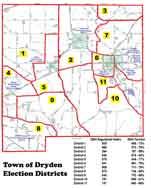Beck Farm Tour
 Beck Farms hosted a gathering yesterday to give local policy makers more insight into farm life. The message loud and clear is that one after another, economic and legislative changes challenge farmers. With each wave of changes a few more farmers quit and some of the rest grow larger.
Beck Farms hosted a gathering yesterday to give local policy makers more insight into farm life. The message loud and clear is that one after another, economic and legislative changes challenge farmers. With each wave of changes a few more farmers quit and some of the rest grow larger.In New York, large farms are still "family farms." Russ is a third generation co-owner of Beck Farms. Russ's grandfather, Martin, started the farm in the 1920s with twenty cows. I met the Becks in the 1980s, when Martin was in his 90s and Russ was working with his father Ron. Becks now farm more than 2,000 acres and milk 1,200 cows.
I've had great respect for the Becks' skill and ethics for the twenty-five years I've known them. The romantic in my heart still loves the image of cows grazing in lush green pastures and the rich yellow cream in milk from grass fed cows.
 But the Becks and their workers know a lot more than I do about what it takes to get a hundredweight of milk to market. Above all, healthy, relaxed cows make more milk. It was much more comfortable in this open barn with its dozens of fans than it was outside.
But the Becks and their workers know a lot more than I do about what it takes to get a hundredweight of milk to market. Above all, healthy, relaxed cows make more milk. It was much more comfortable in this open barn with its dozens of fans than it was outside. Feed components, including corn and grass and alfalfa hay, are stored in these bunkers.
Feed components, including corn and grass and alfalfa hay, are stored in these bunkers.
They're measured out by this bucket loader into the feed wagon which spreads them in front of the cows.
People in the crowd asked about bovine growth hormone (BGH.) There's so much contradictory information in the popular press, I haven't made any effort to take a stance. While I doubt the reassurance of reporters and farmers I don't know, I do know the Becks. I know how well educated they are and how much they care about their business. So, I'm prepared to accept that BGH is a protein that's digested by the cows and does not affect the milk.
 The tour ended back at this tent where it began and ice cream was served! Among those still listening after the two hour tour were, from Dryden:
The tour ended back at this tent where it began and ice cream was served! Among those still listening after the two hour tour were, from Dryden:- Town Board members David Makar and Jason Leifer
- Building Department head, Henry Slater
- Environmental Planner Dan Kwasnowski
- Highway Superintendent Jack Bush
- Planning Board member Marty Hatch
- Attorney Mahlon Perkins
- Conservation Board Chair Craig Scutt
- County Legislator Mike Hattery
 This is Ms 4562 - not a great name, but she's a pretty good looking cow.
This is Ms 4562 - not a great name, but she's a pretty good looking cow.


